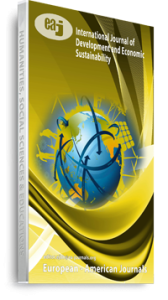This study examined the effect of exchange rate volatility and trade balance on economic growth in Nigeria. The study adopted gross domestic product (GDP) as proxy for economic growth and the dependent variable; while exchange rate (EXR) and trade balance (TBA), were used as the independent variables. A third factor, inflation, was introduced as an intervening independent variable as exchange rate and inflation acting side by side could put pressure on the country’s national output, value of net trade effect and global reserves. Time series secondary data for the variables were sourced from annual reports of Central Bank of Nigeria (CBN) Statistical Bulletins covering the period 2000 to 2017. The study employed descriptive statistics and multiple regression analysis based on the E-views 10.0 software as techniques for the analysis of data. The empirical results showed that exchange rate had a significantly positive influence on gross domestic product, proxy for economic growth; trade balance had an insignificant positive effect on gross domestic product; while inflation had a negative but insignificant effect on gross domestic product. Based on the findings, the study recommended the diversification of the economic base of the country to move away from over dependence on crude oil exports, and the adoption of appropriate macroeconomic policies in order to achieve stability in exchange rate and inflation. It is hoped that future researchers would find the results of this study useful just as the findings of this study would be of immense benefit to policy makers and the regulatory authorities in formulating appropriate policies to stimulate sustained growth.
Keywords: economic growth; exchange rate; gross domestic product; inflation; trade balance

